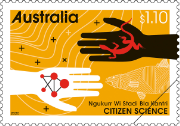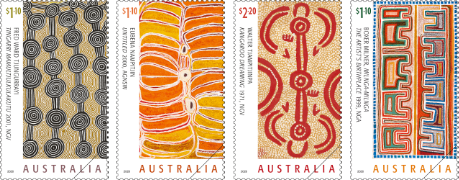History
Timeline results for 1901 to 2020
Found 927 results for your search. Showing page 46 of 47.
Year from 1901, year to 2020
2020
-

The stamp is part of a set of four designed by Jonathan Chong. Australia Post issues a set of four stamps to promote four recent citizen science projects from Australia. Citizen science involves public participation and collaboration in scientific research with the aim of increasing scientific knowledge.
One stamp celebrates the Ngukurr Wi Stadi Bla Kantri ("We Study the Country" in the Kriol language) biodiversity project, a cross-cultural collaboration between the remote Aboriginal community of Ngukurr in south-east Arnhem Land and Macquarie University in Sydney.
The Ngukurr Wi Stadi Bla Kantri project started in 2010, bringing together the Yugul Mangi Rangers, most of the residents of Ngukurr and children at Ngukurr School. It helps equip Aboriginal Elders and youth with the knowledge and tools to better understand and manage South East Arnhem Land environments. Through the project, the team is re-discovering a large and remote area unknown to Western science and working towards maintaining endangered Aboriginal bio-cultural knowledge.
-
For the first time in Queensland’s history, three Aboriginal MP’s hold seats in the state's Parliament: Member for Bundamba, Gubbi Gubbi man Lance McCallum, Environment Minister Leeanne Enoch and backbencher Cynthia Lui.
-
Mining company Rio Tinto legally destroys two 46,000-year-old sites in the Juukan Gorge, Pilbara, WA, to extract $135 million worth of iron ore. Experts called it "one of the worst destructions of an archaeological site in recent memory". [1] The destruction was approved by the WA government's Minister for Aboriginal Affairs in 2013 under Section 18 of the WA Aboriginal Heritage Act (1972), but significant archaeological discoveries were made in 2014, including the oldest example of grindstone technology in Western Australia, and oldest bone tools found in Australia.
Rio Tinto later apologised, but stakeholder pressure forced the resignations of Rio's chief executive, Jean-Sebastian Jacques, head of corporate relations, Simone Niven, and iron ore boss, Chris Salisbury, in September. Chairman Simon Thompson announced his resignation in March the following year.
-
The Royal Australian Navy appoints its first permanent Aboriginal adviser. The role is taken by Muluridji man Lieutenant Commander Samuel Sheppard who has served the navy for more than 20 years.
-
The High Court upholds the Yindjibarndi people's native title rights over land in the Pilbara that includes the site of mining company Fortescue Metals Group's Solomon mine hub. The traditional custodians had first lodged a formal native title claim in 2003. The mine generates roughly $6.5 billion in revenue each year for FMG which does not pay royalties.
-
Triggered by the death of George Floyd, a black man who was killed by a white police officer in Minneapolis in the United States, tens of thousands of people join Black Lives Matter (BLM) protests across Australia to protest the deaths of Aboriginal people in police custody.
-
Actor and Wongutha-Yamatji man Meyne Wyatt delivers a powerful monologue from his play City of Gold to close ABC's Q+A special on racism in Australia that goes viral on social media.
-
In its Art of the Desert issue, Australia Post features works by Aboriginal artists from the Western Desert region. Two were associated with the Warlayirti Artists in Balgo, Western Australia (Boxer Milner [Milnga-Milnga, the artist's birth place 1999] and Eubena Nampitjin [Untitled 2000]) and two with the artists’ cooperative at Papunya Tula, Northern Territory (Fred Ward Tjungurrayi [Tingarri Mamultjulkulakutu (Tingarri men travelling to Mamultjulku) 2001] and Walter Tjampitjinpa [Kangaroo Dreaming 1971]).

The artworks show paintings of the Arlayirti Artists (WA) and Papunya Tula (NT) artist cooperatives. -
TV channel ABC's Insiders program features its first-ever Aboriginal panellist with Yorta Yorta and Dja Dja Wurrung woman Bridget Brennan. [2] The program debuted in July 2001.
-
The Western Australian parliament passes a bill to end the controversial imprisonment of people for unpaid fines. Previously a person unwilling or unable to pay their fine could be arrested and made to pay it off by serving time in prison. A disproportionate number of Aboriginal people fell victim to this policy.
-
Victorian Greens members elect Gunnai-Kurnai/Gunditjmara woman Lidia Thorpe as the new (and first Aboriginal) Greens senator for Victoria, replacing the outgoing senator and former Greens leader Richard Di Natale. Thorpe is an Aboriginal leader and activist and was previously the first Aboriginal woman elected to the Victorian parliament. She formally joins the Senate on October 6.
Thorpe’s appointment brings the number of Aboriginal politicians in the federal parliament to five: Federal Indigenous Affairs Minister, Ken Wyatt (Coalition), Shadow Minister for Families and Social Services and for Preventing Family Violence, Linda Burney (Labor), and Labor senators Pat Dodson and Malarndirri McCarthy.
-
The Victorian government commits to create a truth and justice commission to "formally recognise historical wrongs and ongoing injustices" against Aboriginal people, the first state or territory to do so. [3] The commission will work in parallel with the treaty process already under way, and will be designed and led by the First Peoples’ Assembly of Victoria.
Truth telling is critical to everything we need to move forward, to heal as a state.
— Marcus Stewart, co-chair, Taungurung Assembly [3] -
Australian cheese manufacturer Saputo announces after reviewing a "sensitive situation" that it will retire the brand name 'Coon' because of its "responsibility to eliminate racism in all its forms". The decision comes after many years of campaigning by Aboriginal activists.
-
The Victorian government meets with the First Peoples’ Assembly of Victoria for the first time to officially begin formal treaty negotiations and establish a framework for further discussions.
We’ve never seen this before. It’s never been something so tangible that you can feel you can reach it.
— Marcus Stewart, Taungurung assembly co-chair [4] -
18-year-old photographer Yolngu woman Siena Mayutu Wurmarri Stubbs from Arnhem Land becomes one of the youngest winners in the 37-year history of the National Aboriginal and Torres Strait Islander Art Awards, Australia's most prestigious Aboriginal art awards. She wins the multimedia category with a poetry and video artwork she filmed while on a bullet train in Japan.
-
The Queensland government establishes a Treaty Advancement Committee to provide independent advice on the implementation of the Eminent Panel’s recommendations. The government also accepts (supports and intends to implement), or accepts in principle (supports the intent but needs to consider further), all recommendations of the Panel. [5]
-
Wongutha-Yamatji man and first-time Archibald Prize entrant Meyne Wyatt wins the 2020 Packing Room Prize with his self portrait, titled Meyne. It is the first time an Aboriginal artist has won any of the awards in the Archibald prize's history. (The Packing Room Prize is judged by gallery staff who receive, unpack and hang the entries submitted to the Archibald prize.)
-
APY man Vincent Namatjira, great-grandson of renown artist Albert Namatjira, wins the Archibald prize with a portrait of himself and AFL legend Adam Goodes titled Stand Strong for Who You Are and becomes the first Aboriginal artist to win the prize in its almost 100-year history.
Indigenous art isn't just dot paintings ... We do everything – music, film, photography, contemporary art. We do it all, and we do it really well.
— Vincent Namatjira [6] -
For the first time DNA data technology is used to preserve moving images for archival purposes, and for the first time an Australian video is encoded on DNA. The video chosen is that of Cathy Freeman running – and winning – the 400m Olympic race in 2000, and on this day projected onto the Sydney Opera House.
-
MasterChef judge Jock Zonfrillo's Orana Foundation unveils a database of more than 1,400 Aboriginal ingredients, detailed with their nutritional value, taste profile and potential commercial application. Designed to help make Aboriginal foods commonplace in Australian homes, the Foundation plans to hand over the database to an Aboriginal organisation to use and manage it.
References
View article sources (6)
[1]
'Rio Tinto blasting of 46,000-year-old Aboriginal sites compared to Islamic State's destruction in Palmyra', ABC News 29/5/2020
[2]
'ABC’s Insiders: Host forced to admit its failure to include Indigenous voices', News.com.au 14/6/2020
[3]
[3a]
'Victoria to set up Australia's first truth and justice commission to recognise wrongs against Aboriginal people', The Guardian 11/7/2020
[4]
'Victorian government and First Peoples' Assembly to begin 'momentous' treaty negotiations', The Guardian 3/8/2020
[5]
'Queensland Government’s historic commitment to Treaty-making process', media release 13/8/2020
[6]
''It took 99 years': Vincent Namatjira wins Archibald prize', SMH 26/9/2020

